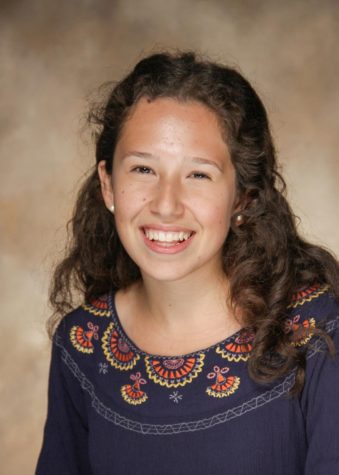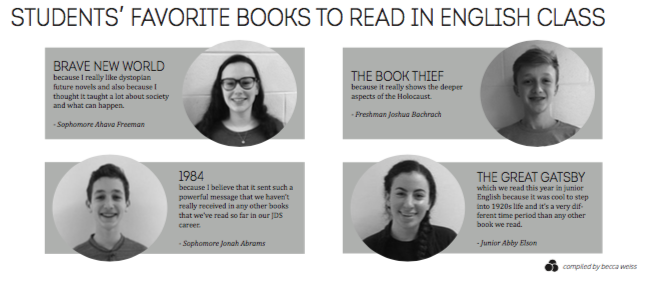What makes the grade: English department addresses students’ concerns about bias
The methodology behind grading an English essay is quite different than grading a math or science test. English teachers have no answer key; the grades they give are a reflection of their own evaluation of the paper. For some students, this loose procedure leads to questions of the subjectivity in their grades and different grading scales among different teachers.
The way that CESJDS English teachers actually grade, however, is not as loose as it may seem. They grade using a formal and informal process of grade norming including self-checks among English teachers. This standardizes the grading process, and though English teachers often norm informally, they are self-checking against other teachers.
“I norm every paper that I do within the classes that I teach all myself,” English teacher Nancy Wassner said. “I teach all of the classes of 10 ECP English; before I put any grades on them I lay them out on a table from not as good to good because I want to make sure if I graded these over the course of six or seven days that I’m giving similar grades for similar concerns.”
To see the norming process in action, The Lion’s Tale sat down with Wassner as well as high school English teachers Melissa Fisanich, Melissa Tomanelli and English Department Chair Thomas Worden. The four teachers graded an anonymous essay written by a sophomore at the end of the year in an ECP level English class multiple years ago.
Before assigning a grade on the paper, the four teachers discussed what had gone well. Because this essay was written at the end of sophomore year by an ECP student, they were looking for strong close reading and the beginnings of a linear argument. These skills are ones worked on in freshman and sophomore year for ECP students. Worden classified the essay as “very 10 ECP” because it gained its strength in the second and third paragraphs.
The teachers agreed when giving feedback on the essay. They all saw the weak topic sentences, offset by close reading and good attempts at a linear argument. When asked what grade the teachers would give the essay, Fisanich started because she “was the least qualified to put a grade on this” since she has never taught sophomore ECP English.
“I don’t know how much time was spent in the classroom teaching the writing skills,” Fisanich said. “Based on what I do in 11 and what I would do in 9 ADV I would be thinking that this is somewhere in the high B, B+ range. Given the context, I could possibly go as high as an A- but turning in something that cuts off and is incomplete would probably disqualify it from the A range.”
The “cut off” that Fisanich mentions is that at the end of the third paragraph, the sentence stopped in the middle and the writer did not finish writing their ideas. The incompleteness of the essay was more of a problem for Wassner, who would give the essay a “flat B.” To her, a B+ shows an exceeding of expectations, and she believes that an unfinished essay does not fall into that category.
Worden and Tomanelli largely agreed, Tomanelli thinking the essay would get a B or B+ and Worden thinking a B+. To improve the essay, all teachers agreed that the topic sentences should have been stronger, along with a clearer linear progression.
“I always think, ‘What is the highest grade I can put on this paper?’ because I am rooting for you guys,” Worden said.
Besides grading the assignment on how well the student met the written expectations, Wassner pointed out that the other side to grading is to assess how well the students met the expectations of the assignment as the teacher explained it. The four teachers agreed with Wassner, and always question if they are doing their part throughout the essay-writing process to explain directions and expectations clearly.
Though the English department had very similar thoughts and predicted grades on the paper, there is still an idea floating amongst the student body that certain teachers grade easier or harsher. Wassner’s response to that is that is it not the “style” of grading that changes, but rather the level and skills a new year in high school demands.
Junior Liam Shemesh is in an advanced English class. He believes that all English teachers are able to tell if a paper is a good paper or a bad paper, but that some subjectivity is inevitable.
“I think that English is really subjective, so it really depends on the teacher how they see my writing and also different teachers are looking for different things at different levels,” Shemesh said. “I think I do not equate between English teachers, expecting them to be the same because they are always trying to help you improve in different ways.”
The notion that different teachers have different styles does not matter to Shemesh. To him, writing is an expressive activity and even if writing to different teachers’ styles would earn him a higher grade, he still would not write for what other people want.
“I’m going to write for what I think is best and what I want because we are always going to have different teachers and in college, too, we are going to have different professors and people are always going to have different expectations for our writing,” Shemesh said.
English teachers often hear from students that certain teachers are easier or harsher graders. When they do, they all respond to the claims. Tomanelli wants her students to feel that she is grading them fairly and trust the process. The English department all take the grading aspect of their job very seriously, and are constantly consulting one another with a question or concern on a paper.
“Almost every time, we are on the same page,” Worden said.
This story was featured in the Volume 35, Issue 5 print edition of The Lion’s Tale, published on March 22, 2018.










